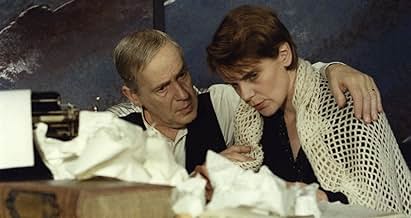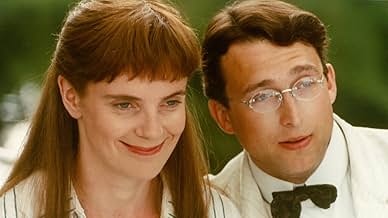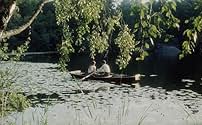अपनी भाषा में प्लॉट जोड़ेंSwedish author Agnes Von Krusenstjerna defies convention and her family's wishes by writing erotic fiction. As she harnesses her talent and explores her own sexuality, she puts herself on a ... सभी पढ़ेंSwedish author Agnes Von Krusenstjerna defies convention and her family's wishes by writing erotic fiction. As she harnesses her talent and explores her own sexuality, she puts herself on a dangerous path.Swedish author Agnes Von Krusenstjerna defies convention and her family's wishes by writing erotic fiction. As she harnesses her talent and explores her own sexuality, she puts herself on a dangerous path.
- पुरस्कार
- 3 जीत और 2 नामांकन
Johan Rabaeus
- Jan Guy Hamilton
- (as Johan Rabeus)
कहानी
क्या आपको पता है
- कनेक्शनEdited into Short cuts från Sandrews (1999)
फीचर्ड रिव्यू
The couple at the center of Mai Zetterling's film are taken from a turbulent phase of Swedish literature, and Agnes von Krusenstjerna (1894-1940) and David Sprengel (1881-1941) made no secret of their need to upset the educated bourgeoisie/upper-class culture of their times and initiate scandal, while they continued to live, in some sense, a highly middle-class life in Stockholm. Ms von Krusenstjerna was one of the first writers in Sweden to explore the female experience of sexuality, of growing up a girl and of feeling disoriented in a world that was changing (she had been 20 when WWI broke out and rang the death-knell of the old order, though this wasn't obvious at once). but so far seemed shut-in to a woman; in particular.perhaps, to a lady grown up in the old nobility. The Krusenstjernas had been colonels and civil servants for centuries but were not a particularly flashy or wealthy family, it was the kind of clan where people will cling ever harder to old traditions in an uncertain new world.
Her mentor/husband/co-writer Sprengel spiced up her books with sometimes weirdly unbalanced homosexual and politically satiric episodes (in their lifetime, the books went out as written solely by Agnes, though some people in literary circles probably suspected that Sprengel had a hand in the pot). Her publishers abruptly dropped her as her books became more outspoken and Sprengel's contribution became more pronounced; they were printed in a semi-legal way by another publisher (who also shirked some of the author's royalty money) and the result was first no reviews at all, then a succès de scandale and a feverishly raging debate about the limits of freedom of print. To many Swedish women writers and artists (in particular), Agnes has reached iconic status. Mai Zetterling evidently read her early on and had filmed the very books that provoked the main offense in "Älskande par" in the sixties; they went down well in the "sexual revolution" climate but also for good acting. Through much of the seventies, she was absent from Swedish cinema and no doubt she felt estranged by the starkly political or popular agenda of many movie makers; "Amorosa" was a powerful comeback, even if not a box-office winner.
The film begins in Venice where Agnes is at a critical juncture; she feels she has come to a final showdown with her parents and relatives and has to fight for her right to write freely. At home, the debate about the books is raging, she receives letters from Nazis mock-inviting her to porno clubs, but wants to dare the public, and her family, even further. Her mental balance gives way, and in a splendid sequence she is taken away to an asylum, straitjacketed in a gondola in the dusky light. The film unfolds in a series of flashbacks from this point, and I won't give any spoilers to a non-Swedish audience.
Mai Zetterling was not out to make a completely realistic movie, just like her protagonist's books are not always tightly realistic. Some of the lines spoken do sound theatrical, but we shouldn't expect people living in an age when it could be seen as offensive for a woman to wear trousers, not to mention going to a gym or being nosy towards men - and this is just eighty years ago! - to talk in the skipping, devil-may-care way we do today.
There was no doubt lots of slang around, but it wouldn't have been accessible to an audience today, so Zetterling has plainly stylized the talk a little. The photography is magnificent throughout the film, with a baroque tinge, placing Agnes and David in deep perspectives, churches, palaces and mansions: you may be reminded of Jane Campion's "The Portrait Of A Lady". It's a joy to watch Stina Ekblad in this part, one of her first starring roles: she brings out Agnes' vulnerability, thoughtfulness and stubborn courage as she pushes into unknown territory. Her movements are in constant interplay with the surroundings, her voice moves from the dulcet and girlish to slashing hatred and despair (a polarity we glimpsed already in her role as Ismael in Bergman's "Fanny and Alexander"). This is not just a film for literary buffs or feminists, it's engaging and understandable quite apart from what you may know about its main characters.
Her mentor/husband/co-writer Sprengel spiced up her books with sometimes weirdly unbalanced homosexual and politically satiric episodes (in their lifetime, the books went out as written solely by Agnes, though some people in literary circles probably suspected that Sprengel had a hand in the pot). Her publishers abruptly dropped her as her books became more outspoken and Sprengel's contribution became more pronounced; they were printed in a semi-legal way by another publisher (who also shirked some of the author's royalty money) and the result was first no reviews at all, then a succès de scandale and a feverishly raging debate about the limits of freedom of print. To many Swedish women writers and artists (in particular), Agnes has reached iconic status. Mai Zetterling evidently read her early on and had filmed the very books that provoked the main offense in "Älskande par" in the sixties; they went down well in the "sexual revolution" climate but also for good acting. Through much of the seventies, she was absent from Swedish cinema and no doubt she felt estranged by the starkly political or popular agenda of many movie makers; "Amorosa" was a powerful comeback, even if not a box-office winner.
The film begins in Venice where Agnes is at a critical juncture; she feels she has come to a final showdown with her parents and relatives and has to fight for her right to write freely. At home, the debate about the books is raging, she receives letters from Nazis mock-inviting her to porno clubs, but wants to dare the public, and her family, even further. Her mental balance gives way, and in a splendid sequence she is taken away to an asylum, straitjacketed in a gondola in the dusky light. The film unfolds in a series of flashbacks from this point, and I won't give any spoilers to a non-Swedish audience.
Mai Zetterling was not out to make a completely realistic movie, just like her protagonist's books are not always tightly realistic. Some of the lines spoken do sound theatrical, but we shouldn't expect people living in an age when it could be seen as offensive for a woman to wear trousers, not to mention going to a gym or being nosy towards men - and this is just eighty years ago! - to talk in the skipping, devil-may-care way we do today.
There was no doubt lots of slang around, but it wouldn't have been accessible to an audience today, so Zetterling has plainly stylized the talk a little. The photography is magnificent throughout the film, with a baroque tinge, placing Agnes and David in deep perspectives, churches, palaces and mansions: you may be reminded of Jane Campion's "The Portrait Of A Lady". It's a joy to watch Stina Ekblad in this part, one of her first starring roles: she brings out Agnes' vulnerability, thoughtfulness and stubborn courage as she pushes into unknown territory. Her movements are in constant interplay with the surroundings, her voice moves from the dulcet and girlish to slashing hatred and despair (a polarity we glimpsed already in her role as Ismael in Bergman's "Fanny and Alexander"). This is not just a film for literary buffs or feminists, it's engaging and understandable quite apart from what you may know about its main characters.
- Strausszek
- 10 सित॰ 2005
- परमालिंक
टॉप पसंद
रेटिंग देने के लिए साइन-इन करें और वैयक्तिकृत सुझावों के लिए वॉचलिस्ट करें
- How long is Amorosa?Alexa द्वारा संचालित
विवरण
- चलने की अवधि1 घंटा 57 मिनट
- ध्वनि मिश्रण
इस पेज में योगदान दें
किसी बदलाव का सुझाव दें या अनुपलब्ध कॉन्टेंट जोड़ें




































